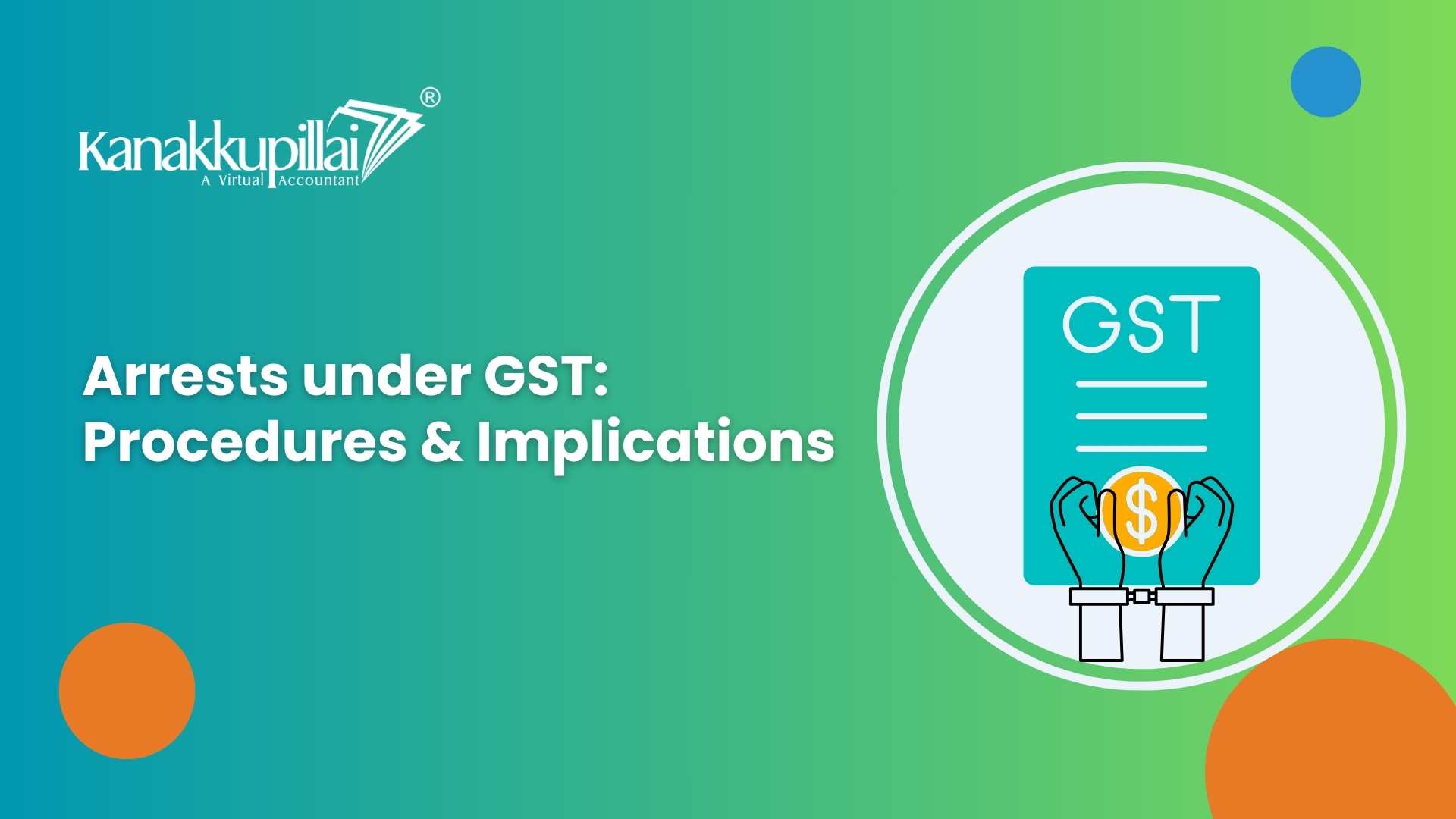![]()
On July 1, 2017, the government implemented the Goods and Services Tax (GST) to replace several prior taxes, including excise duty, service tax, and value-added tax. This tax effectively replaces the previous system of indirect taxes and applies to both products and services traded within India. Let’s now explore the idea of arrests within the context of GST.
When Can Someone Be Arrested Under GST?
A person may be arrested under the terms of GST if they engage in one of the prohibited activities listed in Section 132. In such situations, the offender may be apprehended by any authorized authority under the Central Goods and Services Tax (CGST) or State Goods and Services Tax (SGST). This includes any illegal activity related to GST registration documentation.
The explanation for a person’s detention must be disclosed when they are seized. The arrested person must appear before a magistrate within 24 hours if the offence is deemed cognizable, which significantly violates the law. Due process is respected, and the individual’s rights are protected, thanks to this swift appearance before a magistrate. It serves as a precaution against arbitrary or unlawful arrests and upholds the idea of prompt court involvement.
In effect, a qualified CGST or SGST official has the right to arrest someone if it is determined that they have seriously violated GST legislation. The necessity that an arrested individual appear before a magistrate within 24 hours protects their legal rights and ensures fair judicial processes. This requirement is especially important in cases of cognizable offences.
What are the Offenses?
The list of significant crimes connected to tax evasion and non-compliance is included in Section 132 of the GST Act, where arrest regulations are applicable. These offences have serious repercussions and can result in the arrest of those who commit them. Let’s explain each of these offences in more detail:
- Issuing False or No Invoice: When a taxable individual delivers goods or services without producing an invoice or knowingly issues a fraudulent invoice, it is a serious violation. The GST regulations classify this behaviour as criminal. It entails purposefully avoiding accurate record-keeping and documentation requirements, which are essential for accountable and transparent transactions within the GST framework.
- Incorrect Invoice or Bill Issuance: Issuing an incorrect invoice or bill that falsely reflects the delivery of goods or services constitutes a violation of the GST regulations and is a separate crime. This includes purposefully falsifying transaction information on paperwork, which could result in tax fraud or other illegal activities.
- Failure to File GST Returns: Failing to submit your GST returns to the government within three months is a major infraction. Maintaining correct tax records and ensuring complete compliance with tax legislation depends on the timely filing of GST returns.
- Mishandling of Collected GST: Even if a person obtains GST from clients, they are still required to deposit the money with the government within three months. A GST infraction is committed when this condition is not met. This law forbids people from collecting taxes but failing to pay them to the government, as this could result in lost revenue and tax evasion.
- Repeat Offense: If a person has been convicted of a Section 132 violation under GST and then commits a second violation of the same kind, they are guilty of a felony. This implies that those who have previously received punishment for major GST infractions and subsequently committed the same crime again would suffer harsher penalties.
The objective in these situations is to guarantee that proper tax procedures are followed, transparency is upheld, and people abide by the GST requirements. Arrest regulations can deter tax evasion and encourage legal compliance for certain offences. It’s crucial to remember that these rules are intended to protect the integrity of the GST system and guard against improper or abusive taxation.
Arrest Provisions under Section 132 of the GST Act
The GST Act contains measures for arrest in cases of serious tax evasion in Section 132. In particular, if a person’s tax evasion exceeds the limit of 200 lakhs (2 crores), they may be arrested. This suggests that if a person is determined to have evaded taxes over this amount, the appropriate authorities authorized under the GST Act may make an arrest.
The GST Act contains measures for arrest in cases of serious tax evasion in Section 132. In particular, if a person’s tax evasion exceeds the limit of 200 lakhs (2 crores), they may be arrested. This suggests that if a person is determined to have evaded taxes over this amount, the appropriate authorities authorized under the GST Act may make an arrest.
These measures prevent widespread tax evasion and ensure that those who have already been punished for comparable violations do not violate the GST requirements again. To preserve the integrity of the taxation system and promote legal compliance, the authorities introduced arrest provisions for significant tax evasion and recurrent offenders.
Cognizance of the Offense Under GST
An important principle called cognizance is at play when discussing offences covered under the GST structure. This legal principle controls how the justice system recognises and deals with crimes. It’s crucial to realize that a court cannot publicly acknowledge or take cognizance of any penal offence relating to GST without sufficient authorization.
In these cases, a Magistrate of the First Class has sole authority to bring legal action against a person or an organization that has been charged with a GST offence. This emphasizes the importance of having a particular judicial body competent to supervise and judge GST-related offences. This strategy guarantees that these issues are handled by a capable legal organization well-versed in the subtleties of tax rules.
The need for permission and the involvement of a Magistrate of the First Class emphasizes how meticulously GST violations are handled. This guarantees that the legal procedure is followed precisely and that those charged with GST-related crimes can access an appropriate legal defence. As described in the GST framework, the cognisance procedure works to preserve the harmony between upholding the law and protecting people’s rights when it comes to tax-related violations.
Cognizable and a Non-cognizable-Cognisable Offense?
Depending on their severity and the steps necessary to apprehend suspects, crimes are divided into various sorts in law enforcement. Between cognizable offences and those that are not, there are important differences. Cognizable offences are ones for which police officers can arrest without needing a court-issued warrant. To preserve public safety and uphold justice, these crimes frequently involve major offences like murder, robbery, and forgery.
However, before the police can arrest for a non-cognizable offence, they must have an arrest warrant approved by a court. For example, public violence, forgery, and defamation are examples of these less serious violations. For the legal system to balance community protection and individual rights, the difference between cognizable offences and those that are not is crucial.
Notably, the arrest measures under Section 132 of the GST Act further complicate this legal environment. These rules concentrate on arresting people who have engaged in frequent or serious tax evasion exceeding a certain amount. The relationship between these clauses and the idea of crimes that are punishable by law emphasizes how severe tax evasion is regarding economic and financial law. This distinction also highlights the legal safeguards in place to guarantee adherence to tax laws and preserve the legitimacy of the taxing system.
Conclusion
An important issue arises in the context of Goods and Services Tax (GST) enforcement when a person, even an honest taxpayer, unintentionally fails to pay GST due to a misunderstanding of the tax’s applicability to their circumstance. Although there are acceptable sanctions for such misunderstandings, the risk of property seizure and even arrest may seem out of proportion and unreasonable. Given the relative freshness of the GST structure, this circumstance emphasizes the need for a more sophisticated strategy that strikes a compromise between maintaining the law and providing a fair channel for resolution.
Professional services like those provided by Kanakkupillai can be quite helpful for people struggling to understand the intricacies of GST legislation and looking for guidance in navigating its complex landscape. To assist taxpayers in comprehending their responsibilities under the GST and other tax regulations, Kanakkupillai specializes in offering them expert guidance, consultation, and assistance. With our experience, people can receive advice on correct compliance, prevent unintentional mistakes, and help foster better relations between taxpayers and the GST system.
A more equitable and fair application of the GST system can be achieved by aiming for more clarity in the arrest provisions and seeking expert advice, such as that offered by Kanakkupillai.





